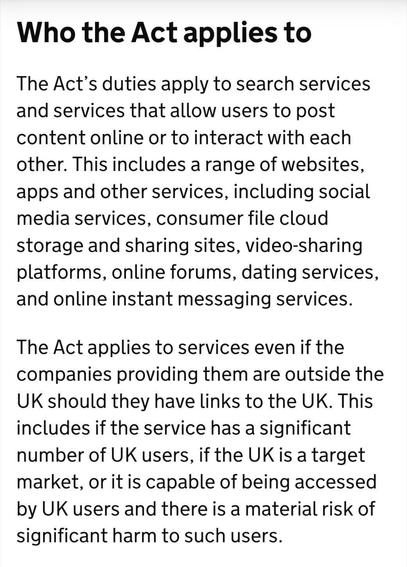I want to step in and point out that there’s a lot of misinformation circulating.
Some people have been incorrectly claiming that if one country passes a certain law, then everyone — everywhere — must comply with it.
That’s not how jurisdiction works.
You’re responsible for following the laws of your own country. Your government can’t impose its laws on the entire world, and neither can any other government.
For example, if Russia suddenly requires that anyone signing up for a website must pay $5 and submit a DNA sample — but your site, and you are based in France — you’re under no obligation to comply. Russia can make whatever demands it wants, but you’re not Russian, and it’s not your responsibility to enforce their laws.
What is particularly troubling about #Bluesky is their aggressive policy of obeying in advance all laws from any jurisdiction. They banned Turkish dissidents under this rationale, and are now preemptively doing UK ID verification. It makes one think these reasons are pretextual, or at the very least cowardly.
Blue Sky is a corporation trying to please its shareholders.
I also don’t know where Blue Sky’s offices are. If they’re registered in a particular country, then they’re subject to that country’s jurisdiction.
But if you're running a forum or a Fediverse site, and neither you nor your server is located there, you can tell them to go to hell — because it’s not your problem.
All valid points. And that is sort of the whole point. Bluesky, as a US corporation without apparently very deep pockets has got to be afraid of their legal exposure if only due to the potential cost of litigation. So, they are not well situated to protect their user's privacy rights.
I’ve supposedly violated the laws of several countries in the past when I ran a forum community. I was allegedly summoned, sued, and even "lost" cases simply because I didn’t acknowledge them or show up. But I couldn’t care less then, and I still don’t — because it was all political theater. I wasn’t a citizen of those countries.
Back in the day, my forum had over 20 million users. I focused solely on following the laws of my own country — not the laws of every country on the planet.
Fantastic work.
Arguably, The Pirate Bay was violating international copyright law — not just the laws of a single nation.
Everyone who has challenged my comment keeps citing extreme cases as examples. But that’s exactly the issue: those are extreme circumstances — just like The Pirate Bay itself.
If you’re reckless enough to violate global, internationally recognized laws, then yes, that’s a problem. But you are not obligated to recognize the laws of every country on Earth, nor can any one nation claim the right to make laws for the entire planet.
If we had international law, then we would need international representation and international taxation.
Last I recall, I never had to pay a percentage of my wages to any international body.
You're right in the strictest sense — there's no single global government enforcing a unified “international law.” What I meant (and should have phrased better) is internationally coordinated legal norms — the kind of standards that are upheld across multiple jurisdictions via treaties, conventions, or reciprocal enforcement agreements.
Copyright enforcement, extradition, anti-money laundering — these all fall under that umbrella. Not because there's a global legislature, but because there's broad state-level consensus and mechanisms for enforcement across borders.
But here's the real point I was making: just because a country passes a law doesn't mean it applies to the entire world. UK law applies in the UK. A platform or individual with no UK presence, business entity, or infrastructure is under no obligation to comply with UK-specific rules — like ID verification — unless they're actively targeting or operating in the UK.
No country has unlimited legal reach. That's why we have jurisdiction. Otherwise, every website on Earth would need to comply with every contradictory law from every country on Earth — which is obviously unworkable.
So yeah, there's no global court or global tax — and that's exactly why no single country gets to unilaterally decide what the world must do.
If you read the post you are replying to then you would see that this is precisely the point Linux is making. Using a 'dude' is not really constructive conversation, particularly when you have misunderstood the thread.
Yes and No.
Running ads on the Internet freely displayable to the whole world on the World Wide Web does not make you subject to every nation on the planet. Any more than having registration open and available to everyone on the planet.
However, if your business is accepting ads from China (random example) those ads would be under China's jurisdiction. It would be in your best interest to be sure your site in Germany (random example) did not get blacklisted by China, preventing you from doing business with other Chinese companies.
As I said, Blue Sky is trying to please their shareholders, so they're going to follow a lot of jurisdictions from a lot of countries, voluntarily.
Yeah, you can /run/ ads anywhere you like but if you're selling them to English companies that are using English Pounds and paying English taxes on the sales then England has a way to sanction you.
Who you sell ads to does not make you subject to the jurisdiction of a particular country.
I can sell digital products and services to every country in the world and I don't need to update my terms of services for every country on the planet.
Side note:
I was previously using Russia and China as examples as to avoid patriotism, which unfortunately complicates matters when you try to have rational conversations on the internet. When you involve patriotism, everyone believes their country somehow supersedes everybody else's. Thank you for everybody, that's not how it works.
But since you want to use the UK, for example. If I am a registered business in the UK, than yes, I am subject to UK jurisdiction. If I have offices in the UK, I am, of course, subject to UK jurisdiction. If I am banking in the UK, once more, of course, I'm subject to UK jurisdiction.
But simply having a website on the internet available to everybody doesn't make me suddenly subject to every country on the planet.
If you have offices in the UK, yes, you're subject to UK jurisdiction.
But selling ads alone does not make you subject to someone's jurisdiction.
For example, if someone bought a campaign ad because they're running against Vladimir Putin, and the Russia government would prefer I not display that ad on my website, that is Russia's problem, not my own.
As I said, Blue Sky is trying to please shareholders.
My comments were generally concerning the Fediverse. There are a lot of people wrongfully believing that everyone, everywhere, must now comply.
The scammer is using that mindset as a form of mental and emotional manipulation.
@TheVampireFishQueen @mastodonmigration
I personally, disagree with Blue Sky's stance on this. But I am also not trying to please shareholders either.
I get why some sites choose to block UK users — it’s the path of least resistance. But I’d rather not take that route.
My goal isn’t to fragment access or limit the reach of the site, especially when there’s no legal obligation to comply with UK-specific laws just because someone from there signs up.
As long as I’m not operating in or targeting the UK, I’m within my rights to keep registration open. UK users are responsible for understanding their own local laws — that burden doesn’t automatically fall on every website they visit.
Blocking might be easy, but it’s not necessary — and it’s definitely not the only responsible option.
@Linux @mastodonmigration The act applies extras territorially. So please be careful if you run a Mastodon server with UK users and have anyone involved in your team that is personally subject to UK jurisdiction.
Edit: Removed "not true" after re-reading your post.
@trashpanda @mastodonmigration
They can word it anyway they want, but they cannot enforce their laws on every nation on the planet and every citizen everywhere.
That is not how the world works.
If it did, we'd all be in deep trouble with Russia, China, and the United States dictating terms to everyone on earth.
Thankfully, it does not work that way.
https://m.alittlenook.net/@trashpanda/114843291275393570
@trashpanda @mastodonmigration
He was wanted internationally for child exploitation material and drug trafficking. He also stepped into the country he was wanted in, and so fell under their jurisdiction.
That's something completely different.
@Linux @mastodonmigration The fact that he was wanted for heinous crimes is less my point. There are examples where the crime is less heinous (United States v. Bowman comes to mind as a specific example).
You would need to travel or otherwise have someone personally subject to the jurisdiction of the country, but I don't think that is so rare. Travel is common, and I am sure Bluesky has employees that fit that description.
I can't in good faith yell at people for doing a thing to avoid arrest.
@trashpanda @mastodonmigration
I'm just going to block you — goodbye.
You're fearmongering and using wild, extreme examples to argue that your country’s laws somehow magically apply to everyone on the planet. That’s not how the world works.
@Linux @trashpanda @mastodonmigration
Australian hacker was charged with crimes in USA.
Was arrested in Australia and extradited to the USA.
Some countries will arrest and extradite their citizens under international agreements.
USA will seek to extradite (remember Julian Assange?) foreign citizens while not extraditing (except accidentally as ICE is doing) it's own citizens.
@skua @trashpanda @mastodonmigration
I feel like you're reaching.
Wiki Leaks, was leaking state secrets. They became an international skeptical and yes, America made a deal with Australia.
That does not mean you need to comply with the laws of every foreign country, and that every foreign country can make laws that apply to everyone on earth.
@trashpanda
Aren't we living in ridiculous times?
(rhetorical question)
It's a quirky space that Johanna Mastodon made for us. I get that blocky feeling occasionally too. People sure got their triggers.
As far as risks go, IMO operators need to quantify the risk of being A. charged under their own local laws, & B. being extradited to face foreign charges.
B. seems very difficult to judge unless your country always refuses to extradite.
I think the risk is low if local laws are followed.
@Linux @Gargron Counter example to your example. Don't travel if you have UK users and plan to violate the Online Safety Act.
https://en.m.wikipedia.org/wiki/Arrest_and_indictment_of_Pavel_Durov
He was wanted internationally for child exploitation material and drug trafficking. He also stepped into the country he was wanted in, and so fell under their jurisdiction.
That's something completely different.
@Linux
While you are not wrong this simplifies the situation a bit too much imo.
If you want to do business in other countries you are going to have to honor their laws. And offering a service is doing business, potentially even if it's offered for free.
Of course the consequences and how impactful they are will depend on the country, a simple block wont hurt someone who doesn't want to make money in that country, but international cooperations tend to want to make money at least in the rich countries.
And if there are trade agreements in place you might even be able to get sued in that other country and your country being required to enforce that. (Something that most western countries and especially the EU member states have between each other to varying degrees)
So imo. it's definitely not as clear cut as "all laws end at the border" these days and it's a bit shortsighted to not take the real complexity of international trade into account, especially on the internet.
As I said in another post, I’ve supposedly violated the laws of several countries in the past when I ran a forum community. I was allegedly summoned, sued, and even "lost" cases simply because I didn’t acknowledge them or show up. But I couldn’t care less then, and I still don’t — because it was all political theater. I wasn’t a citizen of those countries.
Back in the day, my forum had over 20 million users. I focused solely on following the laws of my own country — not the laws of every country on the planet.
No single nation — or any nation, for that matter — rules the world or gets to dictate how you run your website on the other side of the planet. There’s certainly a strong push to make people wrongly believe that’s how it works, but that’s simply not the case.


